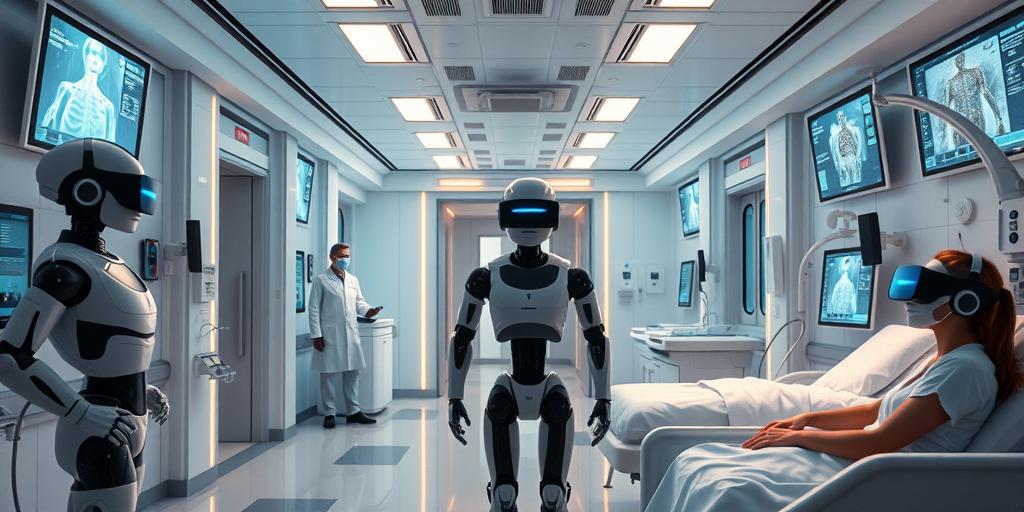The healthcare industry is undergoing a profound transformation, driven by the rapid advancement of digital technologies. This shift, known as digital healthcare, is revolutionizing how patients receive care, how healthcare providers operate, and how medical research is conducted. From AI-powered diagnostics to wearable health devices, digital tools are empowering healthcare professionals and patients alike, leading to improved outcomes, increased efficiency, and greater access to care.
The Rise of Digital Transformation in Healthcare
The healthcare industry has traditionally been slow to adopt new technologies. However, the need for innovation is more pressing than ever. Rising healthcare costs, an aging population, and the increasing prevalence of chronic diseases are putting immense pressure on healthcare systems worldwide.
The Need for Innovation
Digital transformation offers a solution to these challenges. By leveraging technology, healthcare providers can improve efficiency, reduce costs, and deliver more personalized and effective care. This is leading to a surge in investment in digital healthcare solutions, with companies and governments alike recognizing the transformative potential of this sector.
The Impact of Technology
The impact of technology on healthcare is already being felt across various aspects of the industry. From telemedicine to remote patient monitoring, digital tools are empowering patients to take a more active role in their health management. Healthcare providers are also benefiting from digital tools that streamline administrative processes, improve communication, and facilitate collaboration.
Key Technologies Driving Innovation
The digital transformation of healthcare is being driven by a variety of emerging technologies, each offering unique capabilities that are shaping the future of medicine.
Artificial Intelligence (AI)
AI is rapidly changing the healthcare landscape, with applications ranging from disease diagnosis to drug discovery.
AI-Powered Diagnostics
AI algorithms can analyze vast amounts of medical data to identify patterns and predict disease risk, helping doctors make more accurate diagnoses.
Personalized Treatment Plans
AI can also be used to develop personalized treatment plans based on a patient’s individual genetic makeup, lifestyle, and medical history.
Internet of Medical Things (IoMT)
The IoMT refers to the network of medical devices and sensors that collect and share patient data.
Remote Patient Monitoring
IoMT devices enable continuous monitoring of patients’ vital signs, allowing healthcare providers to intervene early and prevent complications.
Wearable Health Devices
Wearable devices like fitness trackers and smartwatches are becoming increasingly popular, providing individuals with insights into their health and encouraging healthy behaviors.
Cloud Computing
Cloud computing provides secure and scalable storage and processing power for healthcare data.
Secure Data Storage and Sharing
Cloud-based platforms enable secure storage and sharing of patient data, ensuring confidentiality and compliance with regulations.
Enhanced Collaboration
Cloud computing also facilitates collaboration between healthcare providers, enabling them to access and share patient information in real time.
Benefits of Digital Transformation in Healthcare
The benefits of digital transformation in healthcare are far-reaching, impacting both patients and providers.
Improved Patient Outcomes
By enabling early diagnosis, personalized treatment, and remote monitoring, digital healthcare solutions can lead to improved patient outcomes and reduced hospital readmissions.
Enhanced Efficiency and Cost Savings
Digital tools can streamline administrative processes, reduce paperwork, and improve communication, resulting in significant cost savings for healthcare providers.
Increased Access to Care
Telemedicine and other digital healthcare solutions can extend access to care for patients in remote or underserved areas.
Challenges and Considerations
Despite its vast potential, digital transformation in healthcare also presents a number of challenges.
Data Security and Privacy
The increasing reliance on digital technologies raises concerns about data security and privacy. Healthcare providers must implement robust security measures to protect sensitive patient information.
Interoperability and Standardization
The lack of interoperability between different healthcare systems and devices can hinder data exchange and create fragmentation. Standardization efforts are needed to ensure seamless data flow.
Ethical Considerations
The use of AI and other advanced technologies in healthcare raises ethical considerations, such as bias in algorithms, informed consent, and the potential for job displacement.
The Future of Healthcare: A Digital Landscape
The future of healthcare is increasingly digital, with several transformative trends on the horizon.
Predictive Analytics and Precision Medicine
Digital tools will play a crucial role in enabling predictive analytics and precision medicine, allowing healthcare providers to identify and treat diseases at the earliest stages.
Virtual Reality and Augmented Reality in Healthcare
VR and AR technologies are being explored for various applications in healthcare, including surgical training, pain management, and rehabilitation.
The Role of Blockchain Technology
Blockchain technology can enhance data security and transparency in healthcare, facilitating secure sharing of medical records and streamlining drug supply chains.
Embracing Digital Transformation for a Healthier Future
The digital transformation of healthcare is a complex and evolving process, but its potential benefits are undeniable. By embracing new technologies, investing in research and development, and addressing ethical considerations, we can harness the power of digital healthcare to create a healthier future for all.









